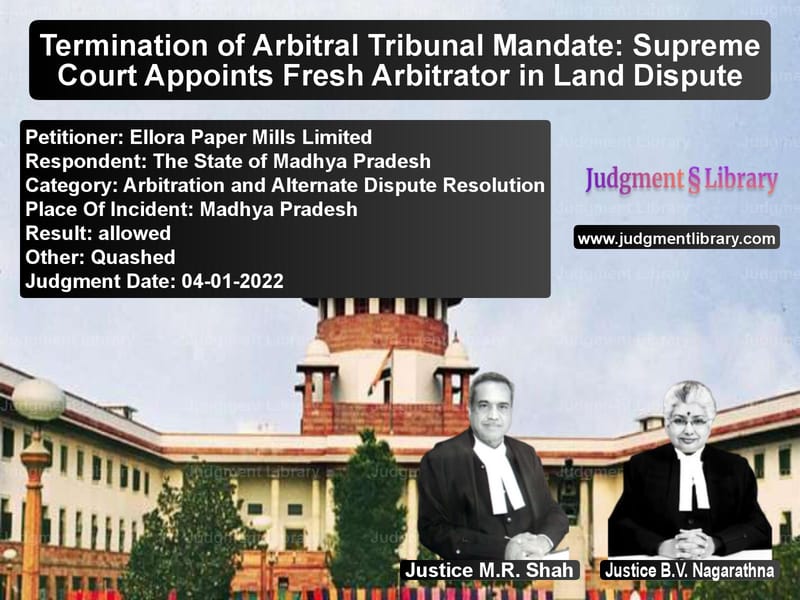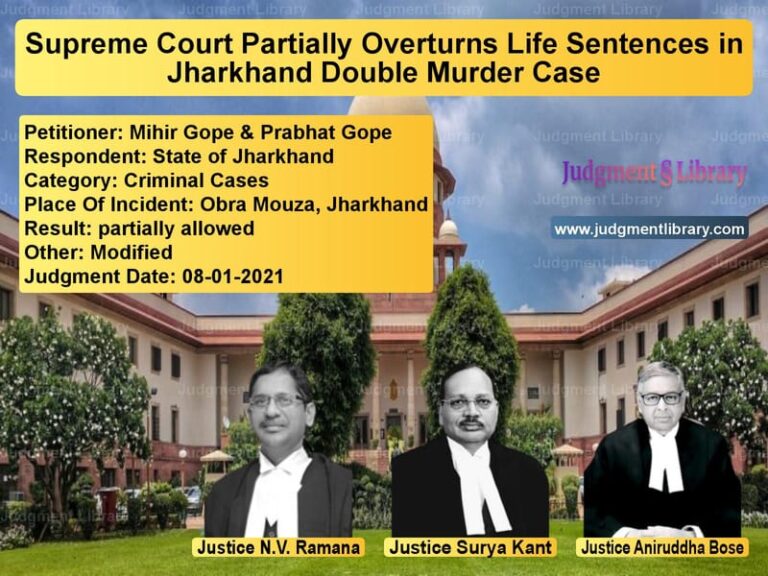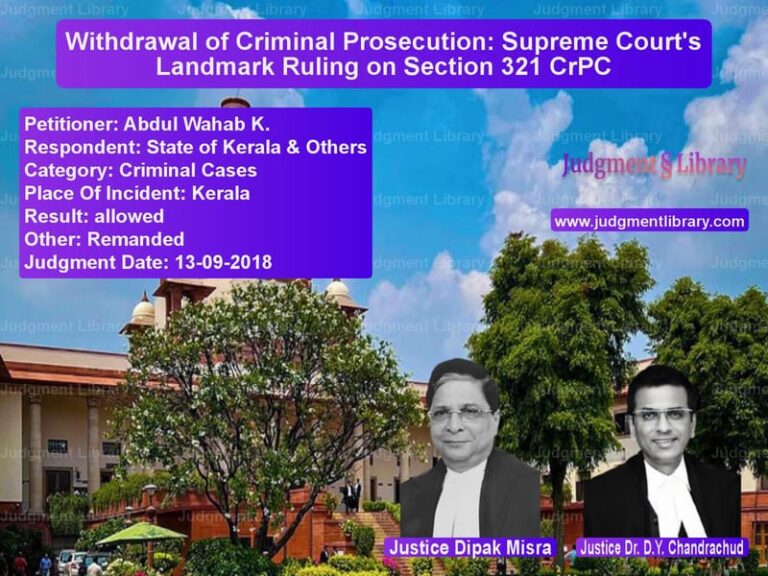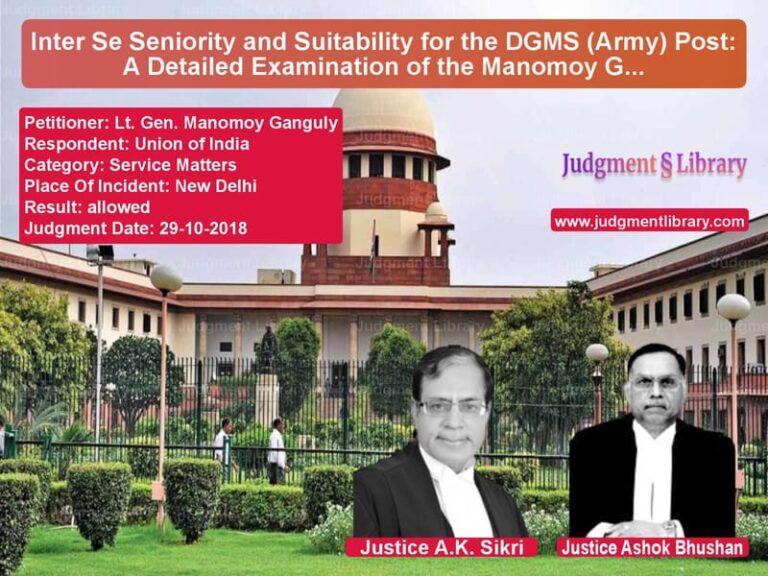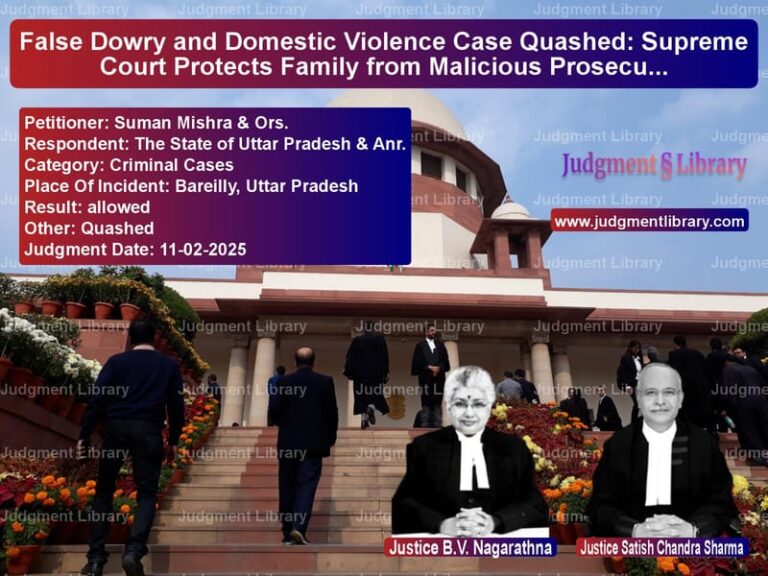Termination of Arbitral Tribunal Mandate: Supreme Court Appoints Fresh Arbitrator in Land Dispute
The case of Ellora Paper Mills Limited vs. The State of Madhya Pradesh deals with the issue of arbitrator neutrality and the application of the amended provisions of the Arbitration and Conciliation Act, 1996. The appellant, Ellora Paper Mills Limited, sought to terminate the mandate of the original Arbitral Tribunal, arguing that the tribunal members were ineligible under the amended Section 12(5) of the Act due to a conflict of interest. The Supreme Court examined whether the mandate of the existing tribunal could be continued or a new arbitrator had to be appointed. The Court ultimately quashed the High Court’s decision, ruling in favor of appointing a new arbitrator.
Background of the Case
The appellant, Ellora Paper Mills Limited, was awarded a contract by the respondent, The State of Madhya Pradesh, for the supply of paper and other related goods. However, a dispute arose between the parties concerning the quality and payment for the goods supplied. As per the terms of the contract, the dispute was referred to arbitration under the Arbitration and Conciliation Act, 1996.
In 2000, the Stationery Purchase Committee, composed of officers from the respondent’s department, was constituted as the Arbitral Tribunal. However, after several years, the appellant filed an application in 2019 seeking termination of the mandate of the Arbitral Tribunal under Section 14 of the Arbitration Act. The appellant argued that the members of the tribunal were ineligible to act as arbitrators as per Section 12(5) read with the Seventh Schedule of the Arbitration Act, due to their conflict of interest, and therefore, a new arbitrator should be appointed.
Petitioner’s Arguments
The appellant, represented by Sandeep Bajaj, argued the following:
- The Arbitral Tribunal’s mandate had been compromised as the original members of the tribunal were employees of the respondent.
- Under Section 12(5) of the Arbitration Act, 1996, the members of the tribunal, being employees of the respondent, were ineligible to continue as arbitrators.
- Relying on the Supreme Court’s ruling in TRF Limited v. Energo Engineering Projects Limited, the appellant argued that the tribunal members had become ineligible and a new arbitrator had to be appointed.
- The Amendment Act of 2015 inserted Section 12(5) to ensure the neutrality of arbitrators, and therefore, the original tribunal’s mandate had to be terminated.
Respondent’s Arguments
The respondent, represented by Nachiketa Joshi, countered:
- The Arbitral Tribunal was constituted before the 2015 Amendment to the Arbitration Act, and therefore, the provisions of Section 12(5) were not applicable retrospectively.
- Section 12(5) could only apply prospectively, and as the tribunal was constituted in 2001, the provisions of the amendment could not invalidate the tribunal’s mandate.
- The appellant’s participation in the earlier proceedings, including the filing of claims, did not warrant the termination of the tribunal’s mandate.
- The High Court’s ruling was justified and no need for a fresh arbitrator had been established.
Key Observations of the Supreme Court
The Supreme Court, in its judgment, observed:
- The mandate of the Arbitral Tribunal was compromised under the amended provisions of Section 12(5) as all members were employees of the respondent.
- Section 12(5) of the Arbitration Act, 1996, mandates the neutrality of arbitrators and explicitly makes it inapplicable to tribunals whose members have any conflicts of interest as defined in the Seventh Schedule.
- The Tribunal’s composition violated the principles of impartiality, and its continued operation would be in conflict with the law.
- The Court considered the TRF Limited judgment and the Jaipur Zila Dugdh Utpadak Sahkari Sangh Limited case, which emphasized the importance of an impartial and neutral arbitrator.
- Even though the tribunal had been constituted long before the amendment, the retrospective application of Section 12(5) was necessary due to the legal and moral imperative for impartiality.
Final Judgment
The Supreme Court ruled:
- The High Court’s judgment was quashed as it wrongly allowed the continued mandate of the original Arbitral Tribunal.
- The Arbitral Tribunal was deemed ineligible under Section 12(5) of the Arbitration Act, and a fresh arbitrator had to be appointed.
- The Court appointed Justice Abhay Manohar Sapre as the new arbitrator to adjudicate the dispute between the parties.
- The Court directed both parties to appear before the newly appointed arbitrator within four weeks for the commencement of the arbitration proceedings.
Implications of the Judgment
The ruling has several key implications:
- Strengthened Neutrality in Arbitration: The judgment reinforces the importance of impartial and independent arbitrators and the legal requirement for their neutrality.
- Clarification on Retroactive Application: The decision clarified the retroactive application of Section 12(5) of the Arbitration Act, ensuring the independence and neutrality of arbitrators in long-pending cases.
- Guidance on Tribunal Appointments: The ruling provides clear guidance on the appointment and constitution of arbitral tribunals, ensuring compliance with legal norms for fairness.
- Precedent for Future Arbitration Cases: The decision sets a precedent for future arbitration proceedings, ensuring that conflicts of interest are addressed proactively.
Conclusion
The case of Ellora Paper Mills Limited vs. The State of Madhya Pradesh underscores the importance of neutrality in arbitration proceedings. The Supreme Court’s ruling serves as a reminder that impartiality and fairness must be maintained in arbitration, and any conflict of interest must be addressed under the provisions of the Arbitration Act, 1996. By quashing the earlier tribunal’s mandate, the Court ensured that the legal framework for dispute resolution remains credible and just.
Petitioner Name: Ellora Paper Mills Limited.Respondent Name: The State of Madhya Pradesh.Judgment By: Justice M.R. Shah, Justice B.V. Nagarathna.Place Of Incident: Madhya Pradesh.Judgment Date: 04-01-2022.
Don’t miss out on the full details! Download the complete judgment in PDF format below and gain valuable insights instantly!
Download Judgment: ellora-paper-mills-l-vs-the-state-of-madhya-supreme-court-of-india-judgment-dated-04-01-2022.pdf
Directly Download Judgment: Directly download this Judgment
See all petitions in Arbitration Awards
See all petitions in Institutional Arbitration
See all petitions in Dispute Resolution Mechanisms
See all petitions in Judgment by Mukeshkumar Rasikbhai Shah
See all petitions in Judgment by B.V. Nagarathna
See all petitions in allowed
See all petitions in Quashed
See all petitions in supreme court of India judgments January 2022
See all petitions in 2022 judgments
See all posts in Arbitration and Alternate Dispute Resolution Category
See all allowed petitions in Arbitration and Alternate Dispute Resolution Category
See all Dismissed petitions in Arbitration and Alternate Dispute Resolution Category
See all partially allowed petitions in Arbitration and Alternate Dispute Resolution Category

